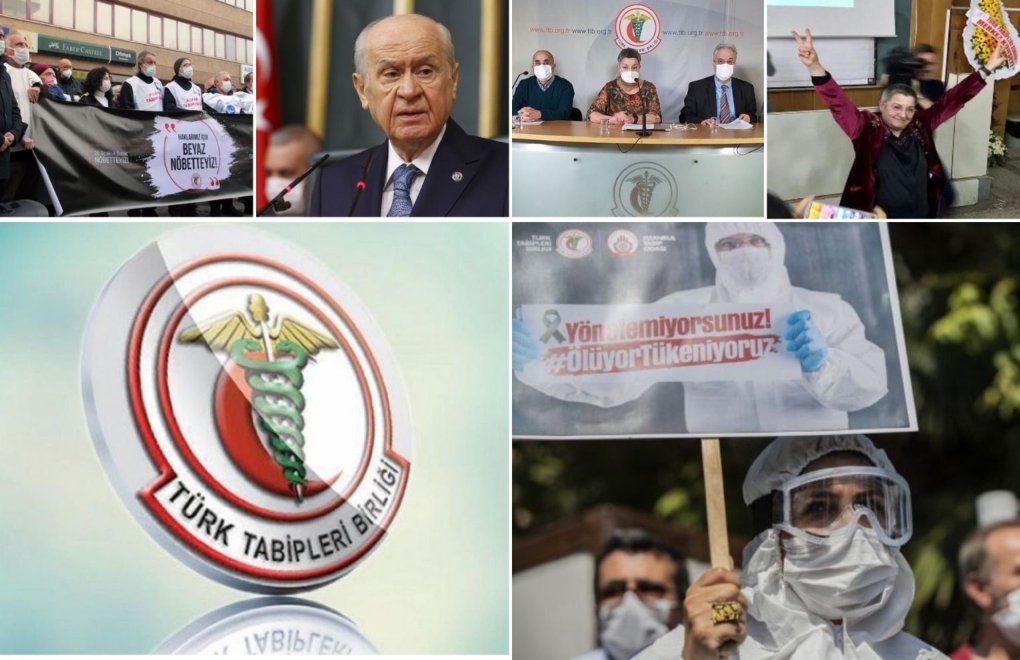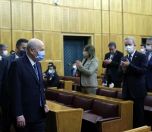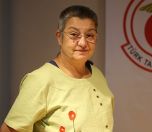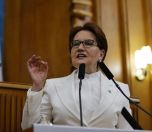Click to read the article in Turkish
In his weekly group meeting today (March 15), Nationalist Movement Party (MHP) Chair Devlet Bahçeli once again targeted the Turkish Medical Association (TTB), claiming that the association is "a small minority who leads citizens to fear when the COVID-19 disease intensifies, fuels concerns and opens Turkey's medical institutions to debate".
But what is the TTB and for which purposes was it founded? What does it do for the medical profession? And what does the TTB do for the medical community? The TTB answers these questions briefly as follows:
When was the TTB founded? For what purposes?
Turkish Medical Association (TTB) is the organized voice of physicians in Turkey, under the constitutional guarantee.
It's a public association founded with law bearing the Number 6023 and 88 percent (100,000) of the country's physicians are members of TTB. Its main income source is membership fees and it doesn't get any aid from the government. Turkish Medical Association has been founded for;
- to protect and to improve and promote the public health conditions of Turkey and work for accessible, high quality health care at convenient prices for everyone,
- to protect the morals of profession,
- to speak and comment on any field of medical education,
- to express benefits of medical profession in every platform,
- to protect all kinds of rights of the profession and the members including materialistic, moral, etc.
- Turkish Medical Association is working on the subjects such as providing professional discipline, investigating patient complaints and determining personal working fees.
The Council of TTB was founded in İstanbul in 1953 and then moved to Ankara in 1983. Turkish Medical Association has a local organization in 65 provinces where the number of member physicians is more than 100.
Physicians must apply to one of these local/regional chambers to become a member of TTB. The executive committees of the regional chambers are formed by 5-7 people who are elected by the members, proportionally to the number of the members. Also the Honorary Committees, the Inspection Committees and the delegates are the fragments of the local organizations.
The delegates from local committees who were elected in every two years elect the Council of TTB, which is composed of 11 people, the Honor Committee and Control Committee in the same time intervals.
Although the membership of TTB is obligatory for physicians working in the private health institutions including private offices, still half of its members are physicians working in public health institutions, who are not obliged to be a member of TTB. Membership fees are proposed by the Grand Congress.
Turkish Medical Association is one of the founder members of Associations of Health Profession Group (with Turkish Dental Association, Turkish Pharmacists' Association, and Turkish Veterinary Medical Association).
At the international level, TTB is a member of World Medical Association (WMA), associate member of Standing Committee of European Doctors (CPME), European Federation of Medical Specialist (FEMS), the Association for Medical Education in Europe.
What does TTB do for the profession?
Turkish Medical Association views the professional competence of physicians and their education/training in various ways.
Turkish Medical Association investigates medical education with respect to quality and quantity and expresses its opinion in every platform for many years by taking into consideration the importance of undergraduate medical education and tries to form public opinion on better medical education.
Turkish Medical Association prepares reports on graduate medical education and expresses its vision about specialty education.
Along with these studies, TTB thinks that its main responsibility is on the continuous education of the physicians. For this purpose, there are professional publications and courses arranged by local chambers. Also, TTB prepared and put into practice an "Evaluation Directive on Continuous Education Activities" for standardization of post-graduate education and in order to transform the continuous professional education into a personal right for the physicians.
Turkish Medical Association arranges continuous education programs in various topics, such as "Sports Medicine, Tourism and Health" courses.
Ethics
The local organizations control the application of Medical Deontology Regulations about professional practice and behaviors. Turkish Medical Association translates the World Medical Association's circulars into Turkish and forms opinions on the subjects specific to Turkey.
What does TTB do for the community?
Turkish Medical Association uses mass communication tools, web sites for public information; answers the people's questions through "doktorum.dr.tr" website and web addresses containing "dr.tr" extension.
There is a press bureau at the central building of TTB. It provides information for press organizations and journalists.
Turkish Medical Association forms attitudes, prepares reports on public health issues and tries to raise public awareness on these matters. Radiation, environmental sensitivity, clean water resources, communicable diseases, critics about health reform proposals and smoking are some of the examples of these studies.
Awards and income sources
Turkish Medical Association gives Dr. Behçet Aysan Poetry Awards, Nusret Fişek Public Health Awards and arranges STED (monthly Journal entitled Continuous Medical Education) Photography Contest every year.
Turkish Medical Association income sources: Membership fees, education activities and publications are the main income resources of TTB.
What does the health data say about Turkey?According to Doğruluk Payı (lit. nugget of truth) fact-checking platform, the Turkish Statistical Institute (TurkStat) shares data about medical institutions as part of its Health Statistics every year. The most recent data is from the year 2018. This data shows that there are 35,559 medical institutions in Turkey. While 1,534 of them have beds for inpatients, 33,025 do not. While there are 231,913 beds across the country in total, the number of beds per a thousand people is 2.83, according to TurkStat. The same data also shows that there were 153,128 physicians in Turkey and the number of applications per physician was 5,110. On the other hand, the most up-to-date data as to the number of physicians, nurses and dentists in Turkey has been shared in the answer of Health Minister Fahrettin Koca to a Parliamentary question of main opposition Republican People's Party (CHP) MP Mahmut Tanal. According to the data shared by Koca in his answer, the number of physicians was 163,594 in Turkey as of January 1, 2020 while this number was 198,465 for nurses. 61.4 percent of these physicians work at the Health Ministry, 20.4 percent at universities and 18.2 percent in the private sector. The total number of dentists across Turkey is 32,859, according to the Minister. In Koca's answer, there is also comparative analysis with the OECD medical data. While the number of physicians per physician is 498.2 in Turkey, this average number is 341.3 in OECD countries. Similarly, while the number of patients per nurse is 431.2 in Turkey, this number is 102 on average in OECD countries. Informing the Parliament at a session on March 19, 2020, when the COVID-19 pandemic had just arrived in Turkey, Health Minister Fahrettin Koca also shared numbers about the Intensive Care Unit (ICU) capacities. According to Koca, the total adult ICU capacity of Turkey's private and public hospitals is 25,466 and 13,211 of this number is advanced level. When the OECD's 2017 figures are concerned, the number of hospitals per a million people was 77.55 in South Korea, which ranked first in the list. South Korea was followed by Japan with 66.39 hospitals and by France with 45.55 hospitals. In Turkey, on the other hand, there were 19 hospitals per a million people, which made the country rank 23rd in this list of 31 countries. With 9.76 hospitals per a million people, Israel ranked at the bottom of the list. Medical training in TurkeyAccording to the Council of Higher Education Atlas, there are a total of 98 medical faculties in Turkey. There are five universities from Turkey in the top 500 medical faculties of the world list of QS Top Universities. These five universities are Hacettepe University (Ankara), İstanbul University, Ankara University, Ege University (İzmir) and Dokuz Eylül University (İzmir). While Koç University (İstanbul) is in the 501-550 ranking in this list, Gazi University (Ankara) is in the 551-600 ranking. According to OECD data, in 2017, there were 10.6 medical faculty graduates per 100 thousand people in Turkey. With 24.9 medical faculty graduates per 100 thousand people, Ireland ranked first in this list. |
(EMK/SD)







